[et_pb_section admin_label=”section”]
[et_pb_row admin_label=”row”]
[et_pb_column type=”4_4″][et_pb_text admin_label=”Text”]This is a guest blog from Shabbir Nooruddin, a successful online entrepreneur and content creator.
Keyword Research For A Niche Site
The key to any successful organic site strategy is keyword research. Whether you’re building a micro site that is concerned with something very specific, or you’re building a huge authority website, you’ll need to research the right keywords to form your content strategy.
I’ve seen sites that have very little off-page SEO work done that get a lot of organic traffic because of great keyword research. I’ve also seen sites that have seemingly solid off-page SEO, but very little traffic due to poor choices of keywords.
The sweet spot for creating a good organic website from scratch is to target low competition keywords for easy wins and to do good off-page SEO to supplement your content.
Before we get any further into the process, I’ll explain how to get started
.
What are keywords and how do they actually work?
Keywords are the words or phrases entered by people in search engines. Anything you search for is a keyword. Here are some examples:
- Best dog whistle
- 2019 Ford Focus price
- Why is the sky orange at dusk
As you can see, anything can be a keyword! Some statistics show that 15% of all searches have never been searched in Google before.
Note: this means the exact phrase being searched, not the topic.
You’ve probably used plenty of keywords yourself, too. Think about the last thing you were researching or looking up online. The phrase you entered in the search box was a keyword.
Not all keywords are created equal, though. Some keywords are a lot more common than others. Over the years, people have become accustomed to searching for information online in a particular way, which is why you see certain trends in the way keywords are found.
Someone looking for the best kind of product will probably search “best dog whistle” or “phone with best camera.” Someone comparing two things will probably search “coffee vs tea” or “cats vs dogs.” Of course, there will be some variations or the same phrase may be formed as a question:
- Which dog whistle should I buy? (best dog whistle)
- Is coffee better or tea? (coffee vs tea)
These are just some examples to get started. Throughout this blog, we’ll dive a little deeper.
How to brainstorm keywords that fit your site
Doing good keyword research involves a lot of lateral thinking around the topic you’re looking into.
Before using any tools (though there is a time and place to start with tools right away,) it’s good to place yourself in the shoes of a potential visitor to your website. If you were looking for information about this topic, what would you search for? What kind of questions would come to mind? This would be the first stage of researching.
As a complete newbie to a topic, you’ll probably be asking very broad questions, like:
- How to start fly fishing
- What is fly fishing?
- What kind of rod do you use in fly fishing?
- What fish can you catch with flies?
- Where do you go fly fishing?

As you start asking these questions and seeing what sort of results come up, you’ll discover deeper, more specific keywords. These will include:
- Terminologies specific to the topic – with fishing, think lunkers, reels, lines, hooks, bait, etc
- Brands and products
Within those terminologies, brands, and products, you’ll find even more specific terms.
Keyword research can be a bit of a rabbit hole if you go too deep, though, so to start, limit yourself to three or four levels of digging. For example:
Main topic:
- Subtopic (1)
- Subtopic (2)
- Subtopic (3)
- Subtopic (2)
Then repeat.
Using just this method of brainstorming and repeatedly Googling around, you’ll be able to find hundreds of keywords and ideas for content in quite a short amount of time.
What is keyword volume and depth?
The next thing to consider as you filter your list is keyword volume. Keyword volume is very important because it shows you how many people are searching for a particular keyword. For example, the keyword “best dog whistle” may have a volume of 6,000 searches per month in the United States.
Note: You can use a variety of keyword research tools to find volume information for the keywords you want to use (more on that below.)
This means that according to Google’s database, every month, roughly 6,000 people search for the exact term “best dog whistle.”
Does this mean there are only 6,000 people looking for dog whistles at all?
Not really! It only shows you the estimated number searching for that exact phrase. In reality, there could be thousands of more people searching for the same thing, but using slightly different wording or phrases.
Still, this number is a good way to gauge the depth of a topic and how popular it is.
Generally speaking, the more specific your keyword becomes, the less volume you’ll see.
One more level of specificity would be “best dog whistles for labradors” which should have less volume than the broader keyword.
A good keyword research plan will include a mix of high volume and low volume keywords.
What is keyword depth?
Some keywords are very deep, meaning that there’s a lot of information that can be presented around the keyword. The ‘best dog whistle’ keyword mentioned above is an example – there’s a lot to say here, like the kinds of whistles available, how to use whistles, who makes them and comparing different models. An in-depth article about best dog whistles could easily run into a few thousand words, and there may still be things left unsaid.
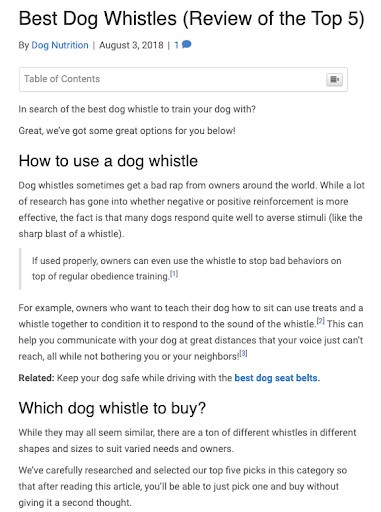
On the other end of the spectrum, there is a super-specific keyword like “how many years does the warranty last on the DogMatic 2000 whistle?”
This keyword would not really warrant a long article, as it can be answered in a few words.
Along with volume, you need to consider keyword depth, too. Generally speaking, higher quality content can be crafted around deeper keywords, though it is certainly advantageous to mix it up and have a few shallow keywords too.
Determining User intent for your keywords
Search engines have become very adept at figuring out what kind of results the searcher wants to see, and as you do your keyword research, you’ll see that certain keywords show a specific type of result. For example, one keyword may show primarily e-commerce product listings, whereas another keyword will show primarily informational content.
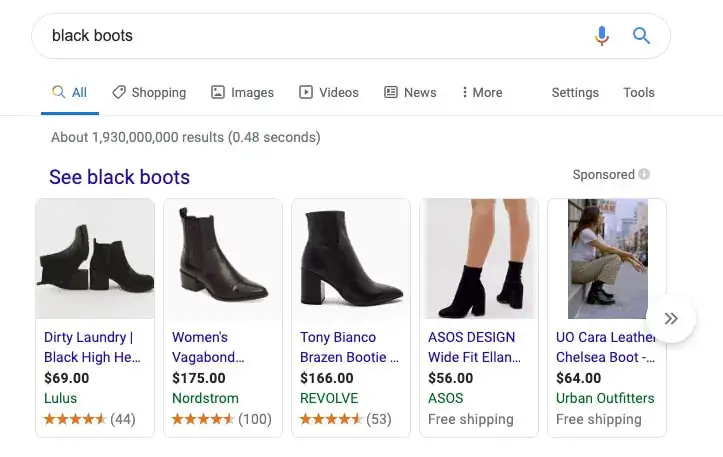
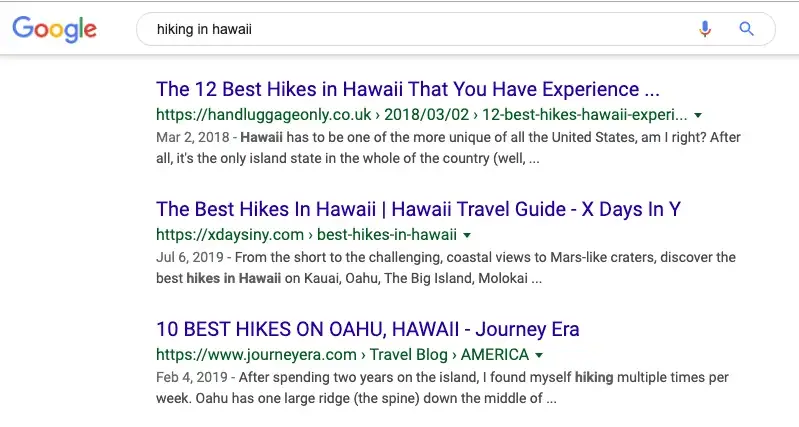
As you do your research, make sure that the kind of content that you are planning to create for a keyword matches the kind of content Google is already showing for it.
You don’t want to write a long informational piece for a keyword where the search results in Google are mostly product listings!
Tools to help you find keyword ideas
So far, you’ve just been brainstorming for keywords on your own. Now it’s time to use the keywords you came up with and enter them into some online tools that are designed to help you find related keywords.
Keywords Everywhere
My favorite free keyword research tool is called Keywords Everywhere. It’s a simple Chrome extension and it’s super handy.
Upon installing it, whenever you search for anything in Google, Keywords Everywhere will show you the estimated search volume for the keyword as well as show you a whole bunch of related, suggested keywords.

As you are brainstorming your own keywords, you can directly see if there is any volume for the keyword or not, and if there isn’t, you can find a related keyword from the suggestions which does have a good amount of volume.
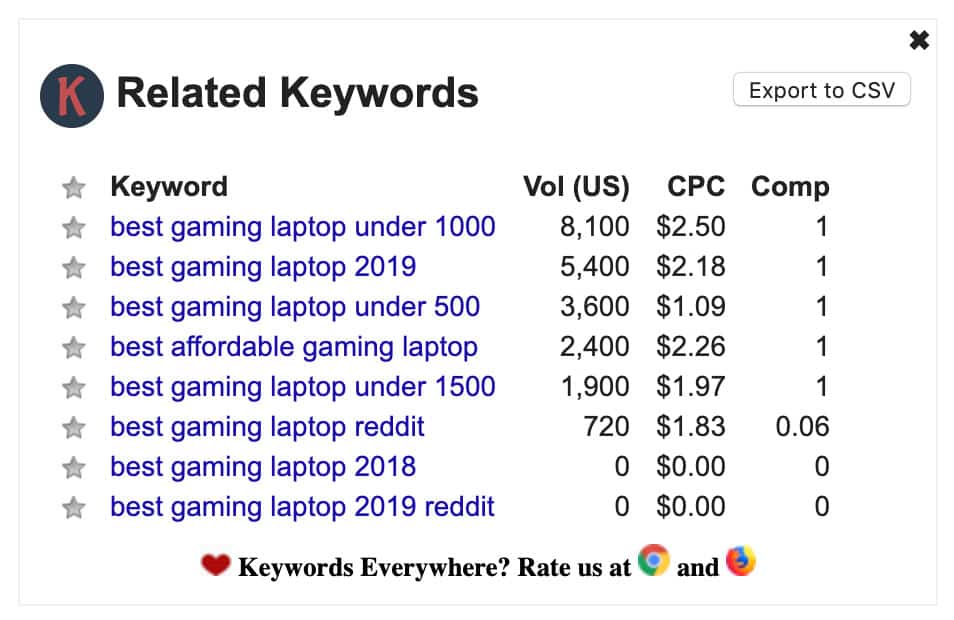
UberSuggest
Another neat, free tool is UberSuggest. UberSuggest basically takes any keyword you give it and spits out a list of suggestions all built upon that keyword.
Keyword search: Dog whistles
Results:
Dog whistles for labs
Dog whistles for collies
Dog whistles for chihuahuas
Etc.
In all of the suggestions, “dog whistles” will be present but you’ll be shown a big list of variants that are made by modifying the base keyword with some more words.
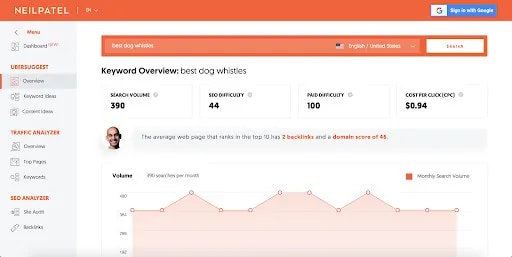
Answer the Public
Answer the Public is an awesome site where you can enter a basic idea keyword like tea, dogs, pets, gardening, and so on, and it will give you a large list of questions people are searching for online surrounding the keyword you input.
The questions follow the who, what, where, when, why, and how paradigm. Answer The Public does not give you volume, but it’s a superb place to go to for ideas. You can then use these keywords against the data from Keywords Everywhere to find good keywords.
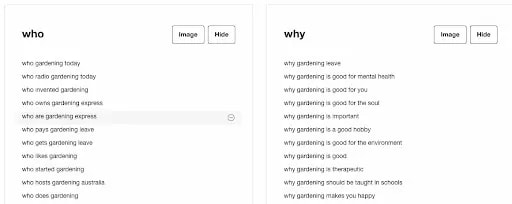
Keyworddit
Keyworddit is a service that extracts the most popular keywords from subreddits on Reddit. Subreddits are basically hived minds of a particular topic, so phrases that are tossed around very often within them are definitely being searched elsewhere, too.
How do you gauge keyword competitiveness?
Of course, you simply can’t take the first bunch of keywords you find, create content around all of them, and expect to rank overnight. As you’re looking for keywords, an important thing to study alongside it is keyword competitiveness.
If you search online, you’ll find many different methods to gauge keyword competitiveness that involves studying a wide variety of metrics. Many folks use these metrics and work them into a formula called Keyword Competitiveness or KC – the lower the KC in their software, the better the potential keyword it is.
Metrics are definitely important, but the fastest way to check the competitiveness is to eyeball a few things:
- Are any of the top 10 results absolutely 100% providing the information that the keyword searcher needs? The fewer results that answer the query in detail, the better.
- For example, the results for a particular keyword may all be answering the question, but mostly in super short 300 word articles. If you feel the question can be answered in a lot more depth, then this can be considered a “good” keyword.
- What kind of sites are ranking in the top 10? Are they all huge, established sites, or do they seem like smaller sites similar to the one you’re looking to build? If smaller sites are ranking in the top 10, you have a shot, too.
These two rules are rather subjective and the more you research and practice, the better you’ll be able to train your eye to spot these kinds of keywords.
Using keywords to make a content strategy
The last piece of the puzzle in building a great organic website is using the keywords you’ve found to start planning your content strategy. By this point, you should have shortlisted around 50 keywords with varying volume and all of which you’ve deemed to be low competition according to the two criteria above.
Broadly speaking, one keyword is one piece of content. Best dog whistles is one piece of content, how to train your dog to sit is another piece of content.
Sometimes, you’ll find that keywords are really closely tied together and if you search for both of those keywords, Google is essentially showing the same pages.
These are good examples of keywords where you’ll make the topic of the content piece the main keyword, and the related keyword will be a subheading.
You can also look for suggested subheadings by searching for your main keyword, scrolling to the very bottom of the search results for the related queries, and seeing which ones you can incorporate under the main topic and relevant subheadings.
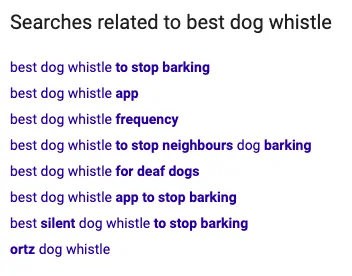
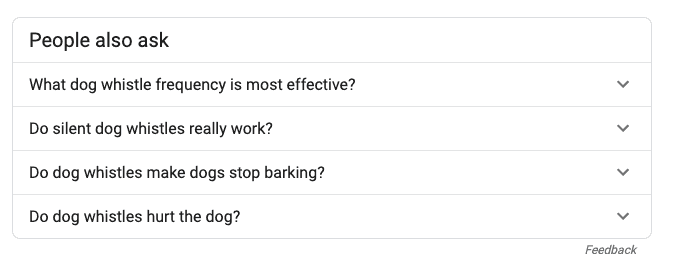
They won’t be the only subheadings, of course, but they’ll definitely be worthwhile additions.
To make sense of your whole content plan, it’s useful to list all the keywords in a spreadsheet, along with topic titles, planned word count (see what the #1 result is doing and make it better), and the type of content (list post, product review, informational post, etc.)
Doing keyword research can save you lots of time
This was a very brief overview of the whole keyword research process. In a future post, we’ll dive deeper into the metrics you can look into for an even more detailed analysis.
Your first analysis should always start with common sense as described above. You can then follow that up with a metric-based analysis.[/et_pb_text][/et_pb_column]
[/et_pb_row]
[/et_pb_section]

